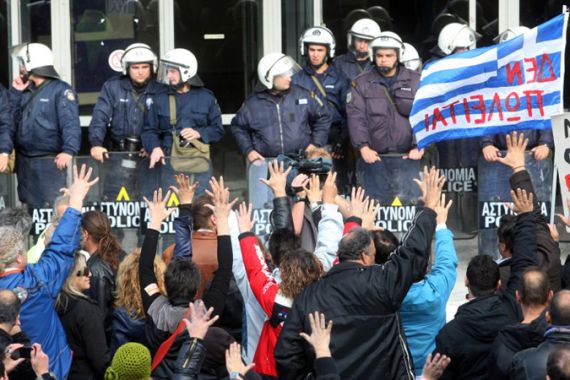Greek protesters assault German diplomat
Coffee and water thrown at consul in Thessaloniki as anger over austerity measures demanded by creditors boils over.

Greek protesters enraged by civil service lay-offs have thrown water and coffee at Germany’s consul in the northern city of Thessaloniki amid chants of “Kick out the Nazis”, police say.
The protesters also tried to kick and punch Wolfgang Hoelsche-Obermaier, the consul, on the sidelines of a conference on Greek-German trade initiatives on Thursday.
“These people haven’t come here to help us, but to announce our death sentence,” Themis Balasopoulos, leader of Greece’s municipal workers union, who was at the demonstration, said.
“Stand united to kick out the Nazis”, some protesters chanted as loudspeakers erected by protest organisers blared a Nazi military marching song.
Many Greeks blame Germany for the tough austerity reforms that have plunged the economy into the worst recession witnessed in postwar Europe.
Hoelsche-Obermaier later said he had lost his glasses in the fracas. Other members of the German delegation were pelted with eggs by the group that numbered around 300 people, according to police.
No arrests made
Officers moved in to extricate Hoelsche-Obermaier from the crowd, but they made no arrests and nobody was injured in the incident, police said.
“Violence is not a legitimate means of debate,” German Chancellor Angela Merkel said in her reaction after talks with Jean-Marc Ayrault, French prime minister.
The incident came a day after Hans-Joachim Fuchtel, German deputy labour minister, said that three Greek municipal staff members were required to complete tasks accomplished by a single German.
“Studies show that 3,000 employees are required in Greece for local administration work carried out by 1,000 people in Germany,” Fuchtel said.
On Thursday, Hoelsche-Obermaier said there had been a “misunderstanding” over Fuchtel’s comments.
“It was a misunderstanding that was resolved. I feel more pro-Greek than ever,” Hoelsche-Obermaier later said.
Greece has been pressured by its international creditors, the EU and the IMF, to cut thousands of jobs from its civil service to earn bailout loans.
About 30,000 people protested in Athens last month when Merkel visited Greece.
Greek views on Germany, already tainted by the memory of a brutal occupation by Nazi forces during World War II, have been further strained by the eurozone crisis.
Europe-wide strikes
German officials have accused Greece of dragging its feet on reforms and wasting precious time bought by EU-IMF loans, to which Berlin is a major contributor.
Hundreds of thousands of Europe’s citizens went on strike or jammed the streets of several capitals on Wednesday, at times clashing with riot police, as they demanded that governments stop cutting benefits and create more jobs.
In Madrid and Barcelona, where the crisis is hitting particularly hard, protesters and police fought street battles resulting in dozens injured and numerous arrests.
The protests were met with tear gas in Italy and Spain, but were largely limited to the countries hardest hit by the austerity measures designed to bring government spending into line with revenues.
Wealthier nations like Germany, the Netherlands and Denmark saw only small, sedate demonstrations.
The zone of the 17 countries that use the euro currency has fallen into recession, according to official figures released on Thursday.
Unemployment across those countries has reached a record 11.6 per cent, with Spain and Greece seeing levels above 25 per cent.